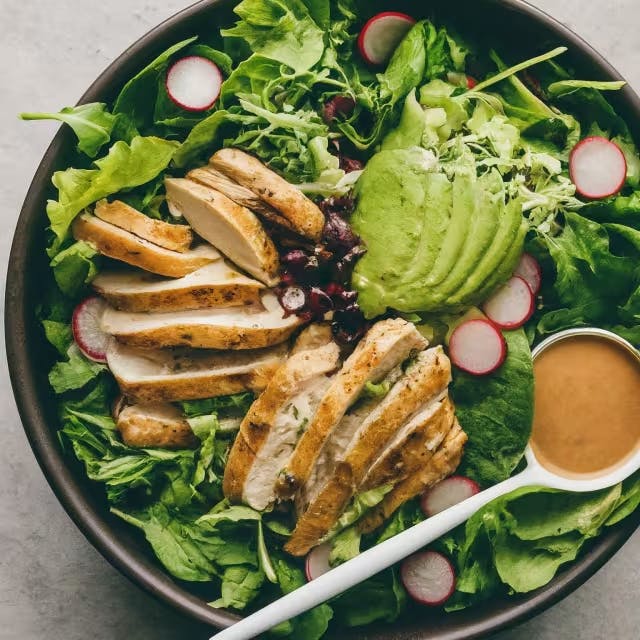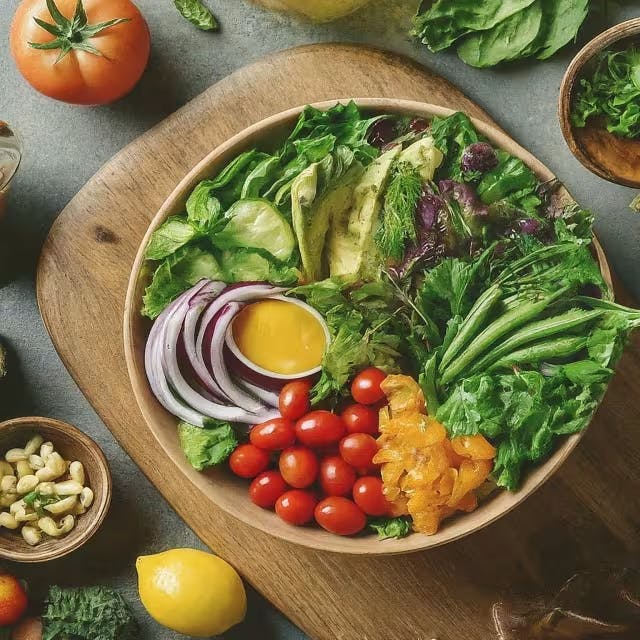Cultivating a Chicken Salad Bar: Fresh Greens for Your Flock
Go4Turf
March 08, 2024

Welcome to "Cultivating a Chicken Salad Bar: Fresh Greens for Your Flock," where we explore the vibrant world of fresh, nutritious greens to enhance the well-being of your chickens. Just as a diverse menu of bowls, pitas, and beverages offers a rich palette of flavors and nutrients for humans, introducing a tailored garden of assorted greens can significantly benefit your feathered friends. This guide dives into why a chicken salad bar is essential for your flock's health, how to select the best greens, and simple steps to cultivate a thriving garden, ensuring your chickens enjoy the freshest and most flavorful ingredients.
Key Takeaways
A diverse range of fresh greens in a chicken salad bar can enhance the overall well-being and health of your flock, similar to the way a variety of food benefits humans.
Selecting the right types of greens for your chicken salad bar is crucial for providing the maximum nutritional benefits and ensuring the safety of your chickens.
Cultivating a chicken salad garden requires simple, straightforward steps that can lead to a sustainable source of fresh ingredients for your chickens.
Protecting your chicken salad garden from pests is an essential step to ensure that your flock enjoys the healthiest and freshest greens without the risk of disease or contamination.

Why a Chicken Salad Bar Benefits Your Flock
Chickens thriving on a diet that includes a variety of greens isn't just beneficial; it's transformative for their health and your garden. Introducing a specific area where your flock can forage for their greens, also known as a chicken salad bar, encourages natural behaviors, which in turn promotes healthier birds and, ultimately, better quality eggs. Here's a quick glimpse into the array of benefits:
Enhanced Nutrition: Fresh greens are packed with vitamins and minerals. Including options like kale, spinach, and Swiss chard adds diversity to their diet, inevitably leading to stronger, healthier birds.
Egg Quality Improvement: Chickens with access to a broader diet lay eggs with richer, more vibrant yolks. This not only looks appealing but is a sign of the enhanced nutritional content of the eggs.
Natural Pest Control: As chickens forage, they'll also snack on pests. This behavior is beneficial for your garden, helping control bug populations without the need for chemicals.
Soil Enrichment: Chicken manure is excellent for compost. As your flock forages, they'll naturally fertilize the area, enriching the soil in your garden.
Diversifying your chickens' diet through a salad bar isn't just about nutrition; it's about promoting a natural and sustainable ecosystem in your backyard. For those embarking on a backyard farming journey or considering an eco-friendly lifestyle shift, Iman's story can offer insights and inspiration on the joys and challenges of raising a chicken flock sustainably.
Selecting the Best Greens for Your Chicken Salad Bar
When setting up a salad bar for your chickens, it’s essential to pick the right greens that prioritize nutrition, taste, and sustainability. Chickens thrive on a varied diet, and a mix of different leafy greens can greatly enhance their health and happiness.
Lettuce is a basic yet beloved choice for any chicken salad. Choosing varieties that tolerate heat will ensure that your chickens have a steady supply, even through the warmer months.
Kale is a powerhouse of nutrients, making it a perfect pick. Its ability to grow in cooler climates means your chickens can enjoy fresh greens throughout the year.
Swiss chard not only adds a splash of color to the mix but is also packed with nutrients. Plus, it's easy to grow, which means you won't have to keep replanting it.
Adding herbs like parsley can spice things up for your chickens, providing them with key nutrients. With the right tips, growing parsley can be straightforward, allowing you to easily offer its health benefits to your feathered friends.
For those wanting to diversify beyond greens, throwing in purple podded bush beans is a great idea. They’re not just nutritious but also add a pop of color to your chicken’s diet.
At the core of a successful salad bar for your chickens is offering a variety of nutrient-dense options that suit their taste and nutritional requirements. By carefully selecting the right greens, you’re not just upgrading their diet—you're also fostering their overall well-being.

Simple Steps to Cultivate Your Chicken Salad Garden
Creating a vibrant chicken salad garden starts with selecting the right mix of greens. Chickens love a variety, so consider plants like kale, Swiss chard, and leafy lettuces. These not only provide your flock with essential nutrients but also enrich their environment. Begin by preparing a dedicated plot near your chicken coop for easy access. Ensure the soil is loose and rich in organic matter for the best growth. For an eco-friendly start to your garden, making recycled newspaper pots is a fantastic way to sow seeds that later can be planted directly into your garden, minimizing root disturbance and waste.
Steps | Description |
1 | Choose a sunlit location close to the coop. |
2 | Prepare the soil by adding compost and ensuring it's loose. |
3 | Sow seeds directly or start in biodegradable pots to protect from early foragers. |
4 | Plant a variety of greens for a balanced diet. |
5 | Regularly water and monitor growth, protecting young plants with a light mesh if necessary. |
When planning your garden, timing is crucial. Utilize indoor seed starting techniques to get a jump on the growing season, especially in cooler climates. This approach allows you to control the environment and ensures your greens are ready to transplant after the last frost, providing your chickens with a lush salad bar through the warmer months.

Protecting Your Chicken Salad Bar from Pests
To keep your greens lush and thriving for your chickens, incorporating natural deterrents and protective structures can be highly effective against pests. Consider planting companion plants like marigolds, which naturally repel garden pests and can add a vibrant splash of color to your chicken salad bar. Also, introducing beneficial insects such as ladybugs into the garden can help manage aphid populations, a common pest on leafy greens.
Implementing physical barriers, such as fine mesh or netting, can provide a shield against larger invaders like birds and rodents. These structures can be easily constructed with basic garden supplies and allow sunlight and water to reach the plants while keeping pests at bay.
Moreover, maintaining a clean and well-ordered garden environment discourages pests and disease. Regularly removing any fallen leaves or overripe produce minimizes the attraction for pests looking for an easy meal. Establishing a routine garden check can help spot any early signs of infestation, leading to quicker, more effective intervention.
For more insights on creating a pest-resilient garden, exploring natural pest control methods can be a rewarding approach. As shared in the informative guide on combatting garlic rust, understanding and implementing preventive measures can significantly impact the health and productivity of your plants.
In essence, safeguarding your chicken salad bar from pests involves a combination of strategic planting, physical barriers, and garden hygiene. By taking these steps, you can create a sustainable source of fresh greens for your flock, ensuring their diet remains varied and nutritious. Cultivating a chicken salad bar: Fresh Greens for Your Flock presents an innovative way to enhance your chickens' diet, well-being, and the quality of their eggs. By carefully selecting a variety of greens and herbs, and taking steps to protect your garden, you are investing in not only the health of your flock but also in the sustainability of your ecosystem. A thriving chicken salad garden fosters a natural environment for your chickens to exhibit their instincts while providing them with a nourishing and diverse diet.
Frequently Asked Questions
What are the key benefits of adding a salad bar to your chicken's diet?
Adding a salad bar to your chickens' diet enhances their nutrition through access to a variety of fresh greens, which leads to healthier birds and better quality eggs. It provides natural pest control as chickens eat unwanted bugs, benefiting your garden without the use of chemicals. Additionally, as chickens forage, they naturally fertilize the soil, enriching your garden ecosystem and promoting a sustainable environment.
How can you select the right greens to cultivate for your chicken salad bar?
Selecting the right greens for your chicken salad bar involves choosing nutrient-rich, diverse options like kale, Swiss chard, and leafy lettuces. Consider the growing environment by preparing a plot with rich organic soil near the coop and protecting young plants with light mesh. Diversify with herbs and colorful additions like purple podded bush beans for extra nutrition. Start seeds indoors to extend the growing season, ensuring a continuous supply of fresh greens. Incorporating natural pest deterrents and companion planting can help protect your garden without the need for chemicals, creating a healthy and sustainable food source for your chickens.
What are some eco-friendly tips for starting your chicken salad garden?
To start an eco-friendly chicken salad garden, begin with plants like kale, Swiss chard, and lettuces, known for their nutritional value. Use biodegradable pots for seed starting to minimize waste and ensure a healthy growth environment. Incorporate natural pest deterrents like marigolds and beneficial insects such as ladybugs to protect your greens. Implement physical barriers, such as fine mesh, to keep larger pests at bay, and maintain garden hygiene by regularly removing fallen leaves or overripe produce. This approach not only enriches your chickens' diet but also promotes a sustainable ecosystem in your backyard.
How does introducing a variety of greens impact the health and behavior of chickens?
Introducing a variety of greens into the diet of chickens results in multiple benefits, including enhanced nutrition from the diverse vitamins and minerals found in greens like kale and spinach. This improvement in diet leads to better egg quality, with eggs having richer yolks. Additionally, as chickens forage for these greens, they naturally engage in pest control, benefiting your garden while also enriching the soil through their manure. Consequently, by providing a mix of nutritious greens, you contribute to healthier chickens and a more sustainable garden ecosystem.
What natural pest control methods can protect your chicken salad bar?
Protecting your chicken salad bar from pests naturally can involve introducing companion plants like marigolds to repel garden pests, integrating beneficial insects such as ladybugs to control aphids, and using physical barriers like fine mesh or netting to protect against larger pests. Regular garden maintenance, including removing fallen leaves and overripe produce, also plays a crucial role in minimizing pest attractions. These measures, combined with strategic planting and garden hygiene, create a sustainable and pest-resilient environment for your chickens' foraging needs.
What steps are involved in setting up a successful salad bar for your chickens?
To set up a successful salad bar for chickens, choose a sunlit location near the coop, prepare the soil with compost, and plant a variety of nutrient-rich greens like kale, Swiss chard, and lettuces. Utilize biodegradable pots for seed starting to minimize disturbance. Protect young plants with light mesh and incorporate companion plants like marigolds to naturally repel pests. Regular watering, monitoring growth, and maintaining garden hygiene by removing fallen leaves or overripe produce help prevent pest infestations and diseases. This creates a sustainable and nutritious forage area for your flock.